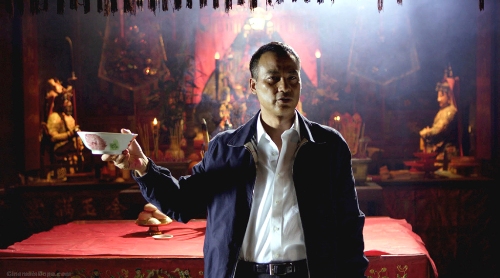
The two Elections as its filmmakers likes to claim are gangsters film where no shots are fired. This doesn’t mean they aren’t violent films in their own way. The brutal intensity that Johnnie To sustains throughout Election 2 is almost intolerable. What matters for To here is much less keeping his position as an action auteur – that he did in Exiled released a bit later – but try to come to terms with a state of barbarism that he seems taking post-holdover Hong Kong.
It is no surprise that both Elections are films without shootouts as To uses the triads as a starting point: as Election 2 progresses it gets more and more clear that the film center is far away from organized crime. If Election – in retrospect, a first draft – shows the triads tradition dissolving in a desperate power struggle, Election 2 has not even time to subtle things like symbolic power batons. Simon Yam, who ascend to power on first film, wants to rewrite rules to allow his reelection, Louis Koo who helped him get there wants to just keep his attempts to legalize his dealings until an encounter with Mainland China bureaucrats makes clear he needs the power to achieve that. Koo’s ambition expands Election 2 beyond the careful build gangster world and reveals a much larger corrupt universe.
As a political film, Election 2 is exemplary. To ably filters his preoccupations through his narrative and there is no false rhetorical move. The filmmaker’s wrath, visible on screen, never clouds his perceptive gaze. It is no surprise that unlike other major gangsters films – from Scarface to The Godfather – there is no attempt here to mythologize its central figure, one never lose sight that Louis Koo is no more than a delusional criminal, despite all his good manners. In this sense, there is a powerful sequence involving some frightened gangsters, a doghouse and meat grinder.
What Johnnie To really succeeds is in given Koo and Yam’s large ambitions a concrete existence which propels the constant feeling that everything else in their worlds are a disposable accessory. Election 2 is never more alive than when describing the feeling of being in this world where there is no break to ambition and no way to control all the many indivisual interests. There is a sense of paranoia filtered by a political gaze and shown through an expressive editing and eye to small nuance of behavior.
Johnnie To also never loses historical perspective on what he describes: what gives Election 2 a special bitterness, is its emphasis on children. The film’s strongest scene involves a man being stabbed as he watches his son literal run to a life of crime (an idea that To replays in a more abstract but equally powerful way in the climax). What makes Election 2’s last 20 minutes so oppressive and tragic is this certainty that violence is there ready to embrace the future generations. Not even the young can escape Election 2’s state of barbarism.






